New Dylans - Interview
by Malcolm Carter
published: 25 / 8 / 2015
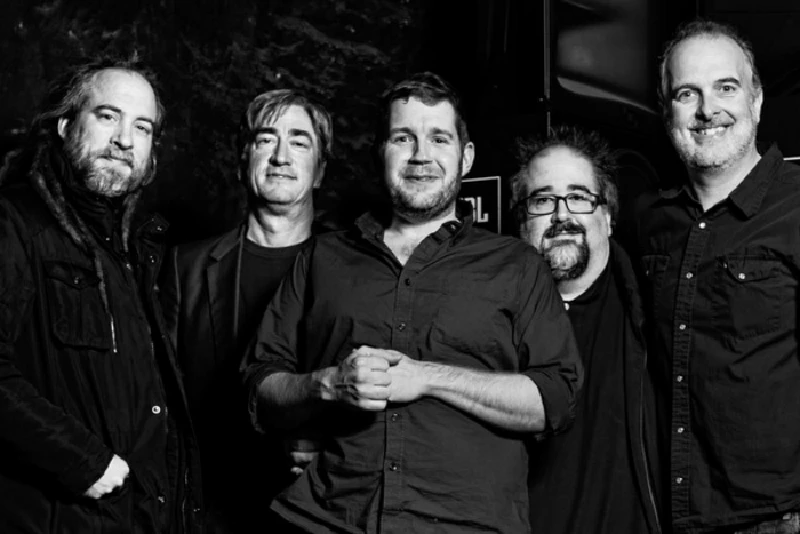
intro
Americana act the New Dylans return twenty years after they split with a new album, 'Meta'. Malcolm Carter speaks to co-founders Reese Campbell and Jim Reilley about the past and their future plans for the band
It’s not uncommon now for bands to leave an increasing number of years between releases; they split up, take extended breaks, fall out and make up, then suddenly a new album appears, unfortunately it’s not always what the fans were expecting. It’s been twenty years since we last had an album from The New Dylans and thankfully ‘Meta’, which is released in the UK this month, is more than their loyal legion of fans could have hoped for. Jim Reilley and Reese Campbell co-founded The New Dylans in 1985 in Warren, Pennsylvania but despite being hailed by Michael Stipe as one of his favourite bands and having their six-song EP (featuring John Lombardo and Jerome Augustyniak of 10,000 Maniacs) played on Radio 1 the band split at the end of 1987. The duo first reunited in 1992, which led to Red House Records releasing two albums, 1993’s ‘Warren Piece’ and 1995’s ‘The American Way’, to critical acclaim, but the band split again in 1996. Mainstays Reilley and Campbell stayed in the music business, but went their separate ways. But early 2014 found the duo once again working on an album of original material, which was documented by The Tennessean (Nashville’s daily newspaper) and which no doubt put the smile back on the faces of those fans who thought they would never hear another album under The New Dylans banner. Just in case this was a one-off between their other musical projects and because ‘Meta’, although impressive from the start, is proving to be something of a grower too, we took the opportunity to put a few questions to both Jim Reilley and Reese Campbell to catch up on what they have been doing musically and to find out if there are plans for any more recordings by The New Dylans now they’ve made this initial move. We would like to thank them for their time and for the full and interesting answers they gave to our questions. PB: The band has split twice before, once in 1987 after your debut EP had been warmly received and once more, after two album releases, in 1996. What were the reasons behind the members going their separate ways on those occasions? RC: The critical buzz surrounding our 1986 EP was totally unexpected and, since we had borrowed John Lombardo and Jerry Augustyniak from 10,000 Maniacs as our rhythm section for recording, we found ourselves stranded in rural NW Pennsylvania without a band to tour with and unable to capitalize on it. We were pretty wet behind the ears and it never really occurred to us to try to put together a touring band without them, so the star just kind of fizzled out. After we got back together in the early 1990s and signed with Red House, we began to tour coast-to-coast without any meaningful financial or logistical support from the label. I was doing all the booking and it was hard to negotiate good deals and put together sensible routes, and we always returned home with nothing to show for it, in fact often having lost money. In retrospect, we should have started on a smaller more sustainable scale and built a following region by region, but once again we showed our naivety. After what turned out to be the final tour, I was broke, going through a divorce, and drinking heavily, and I just didn’t have the will to write, to book another tour or do much of anything. To his credit, Jim gave me time to get my act together, but eventually decided he had to press forward on his own and move to Nashville. JM: Reese’s answer to this question perfectly explains both breakups. All I would add is that in 1987 I had just gotten married and had that responsibility as well (hadn’t perfected my self absorption yet) and also we really had no idea where to even begin. It’s funny, Dylan once said “An artist must be careful to never think he has arrived somewhere, he must always be in a constant state of becoming.” I guess we were living that quote. As for the second breakup, as Reese said we had spent several years slogging it out on the road with really nothing to show for it. The allure of sleeping on 7/11 bathroom floors and crack houses coupled with little or no label support, gruelling travel and a dying live music scene had worn really thin. They always say they don’t pay you to play, they pay you to travel and that had really hit home to me. Reese and I both donated a lot of our nervous systems to the road. To this day, I have many issues related to those years spent in a van. The other major factor for me calling it a day was that after a tour Reese and I would usually have to audition replacement bassists or drummers since we never made any money and it just got really old. I had some friends in Nashville who convinced me I could make a really decent living as a songwriter and session guitar player so I figured I’d give it a shot. PB: What prompted the reformation of The New Dylans this time? RC: In late 2007, I was back in Warren looking after my elderly father and decided to put together a band called Modified Nouns to record some of the songs I’d written since The New Dylans' breakup number two. I thought it would be fun to have Jim produce the session, so we headed to Eric Fritsch’s studio in Nashville for a few days. Although for logistical reasons we weren’t able to finish the record there, Jim and I had a great time hanging out and playing together again, and for me that got the mojo flowing to try another record together as The New Dylans. I think we both felt there was some unfinished business there. JR: I’ve been in Nashville for 18 years and have been writing songs and producing projects full time. I really have become a lover of the possibilities here and have always been fascinated by the palpable history of the place. Ironically, the current popularity of Nashville has invited developers to come in and gut some of the historic buildings, along with much of the vibe and charm of the Nashville I first fell in love with. Even my most successful peers can't afford the $600,000 condos that are springing up everywhere but alas, such is progress. Anyway, even though I’ve busted my ass to create a presence here as a writer who has been lucky enough to have several of my songs recorded by major artists, and as a producer and session player, I still would get people who knew of my New Dylans past asking “what’s the possibility of another album” or “will you guys ever play again”? At first, I was frustrated because I am not one who looks backwards and viewed The New Dylans as a closed, albeit cherished, chapter of my life. Then when Reese’s dad (who along with my mom) was a huge supporter of the band passed away, I took some time to go back and listen to the old music (something I usually never do). What struck me most was how much I liked the songs we created but how little I liked the production. In the 18 years since we recorded that last album, I have produced over 50 albums and have learned so much about recording that I wished I could go back and re-record and remix all those albums. Around that same time, I was doing an interview for American Songwriter magazine and the interviewer asked me about The New Dylans and about our small but dedicated fan base and something clicked inside of me. It was like I felt that so many people who had been carrying our torch for so long maybe would want something new and all of a sudden I wanted to leave something I was really super proud of to that legacy we worked so hard to create. I reached out to Reese and he was feeling the same thing I think so... off we go. PB: You are now playing a couple of well-respected musicians, how did this line-up come about? RC: That’s all Jim. He has become very well known and respected in Nashville and has many extremely talented friends there. Ken Coomer is an incredibly inventive and musical drummer, always thinking outside the box, and Chris Autry is truly one of the finest, most versatile allround musicians I’ve ever known. We are so fortunate to have him, as it’s only a matter of time before he shows up on the radar of somebody really big. Plus the cavalcade of guest stars Jim roped in - Paul Deakin, Tim O’Brien, Roy Agee, Carissa Shockley... wow. I was just lucky to be along for the ride. JR: One of the great things about being in Nashville, is the vast population of amazing musicians. I’ve been lucky enough to befriend many of these people and, as a producer, hire them regularly to record on projects I produce. I have been a fan of Ken Coomer’s drumming since the Wilco/Uncle Tupelo days and he played on my second solo album several years ago so he was a natural fit. Chris Autry is one of the most musical people I know and is my first call bassist on projects I produce so he was the most obvious choice. Tim O’ Brien is probably my oldest Nashville friend. I met him the first week I moved here. I’d been a fan of his for years before moving here and when I got here, Jim Rooney (a great writer and producer) introduced us. Literally my first week in Nashville I’m at Tim’s house writing a song with Tim making me burritos for lunch. The following week, I was in Garth Brooks’ studio with Tim, Sam Bush, David Grier and Charlie Chadwick recording a song Tim and I wrote for an album called “Celebration Of The American Farm” for Farmer’s Almanac Records. That is a great memory. Roy Agee plays trombone for Prince and Chris Autry suggested we use him on the project. He has since become a good friend. Carissa Shockley was a friend from the coffee shop who is a brilliant string arranger. Paul Deakin of The Mavericks has been a friend for many years and played on my last solo record, 'Thank God I’m A Contrary Boy' along with Ken. He’s an amazing drummer of course, but is also a brilliant vibes player. PB: I can remember a time when every acoustic-wielding troubadour was labeled the new Dylan. Who came up with the band name originally? It’s not like you owe a great debt to the man with your sound. RC: That’s it exactly. We chose the name as a tongueincheek reaction to the way the music press (present company excepted, of course) is so quick to pigeonhole new artists. JR: If memory serves, it was Reese who offered up the title. We were initially calling the project Velvet Elvis but Reese and I also had a previous band called The Dog Has Wheels. Yipes! I guess The New Dylans was the smart move. Actually it’s a good name because a lot of people who have heard the term think it’s because they know the band. Reese’s major in college was business after all. PB: Although you’ve all been involved in music in some way since we last heard from The New Dylans, did you find that much has changed in the way you put ‘Meta’ together compared to your earlier albums under the group name? RC: Obviously, technology has changed and made production a lot easier. We did record a lot of Meta to 2” tape, like the older records, but Eric was able to dump it all onto his digital platform and proceed with all the newfangled wizardry from there. Personally, I’m very pleased we live in a world with vocal pitch adjustment! And in terms of collaborative songwriting, despite the fact that Jim and I live 600 miles apart, the advent of smartphone voice memo and file sharing technology actually allows us to share ideas more quickly and efficiently than we could when we lived in the same town. I still find it all pretty amazing. JR: Music is constantly changing these days so we are a reflection of our environment. In terms of how we put the record together, nothing this time was really different except that we wrote most of the songs long distance and used technology to share ideas via email and iphone voice memos, which is just basically how we used to share ideas via cassette. I personally love the technology and surely don’t miss carrying around a bag of unlabeled 120 minute cassettes searching for a 5 second song idea. I had a pretty good visual concept of the record in my head. As a producer I tend to view projects as visual like little movies and it helps me find all the missing pieces easier. I knew I wanted connector songs (clearly not everyone’s cup of tea) but I like little moments to contemplate themes before slamming into a new song. PB: The band was highly regarded by the time of your last album, some twenty years ago, and so much has changed, do you feel it’s going to be more of a struggle this time round or easier as you already have a fan base from back then? JR: Honestly, it’s the last thing on my mind. I primarily made this record to please myself artistically and any kind of positive response we receive will just be gravy on top. That being said, we have been trying to use social (or antisocial) media to promote this record. It is a weird game having to constantly keep creating content. The kids seem to spend all their time creating content on their twitter pages instead of actually living a life with content. I have yet to meet anyone as interesting as their social media makes them seem. It is also funny that we are using a young person's technology to promote the music of two 53 year old men. It won't be a struggle because we aren’t as hungry or needy as we once were. RC: It’s going to be a mixed bag. We have a small base of hardcore fans who have been waiting for this day for a long time. But most of them have already bought their CDs and t-shirts, so we have to figure out how to make new friends in this brave new world of digital downloads/streaming and social media. We’ve been reaching out to Spotify while wondering if traditional radio is even worth pursuing anymore. We’ve got TheNewDylans.com, the Facebook page, the Twitter account, and we do use them to promote and publicize things, but we don’t have any overarching strategy to reach the Millennials, say, other than to announce that we've pressed up 100 units of vinyl. It’s pretty clear that, in the wake of Napster et al, nobody under the age of 30 wants to pay for recorded music, so you’re going to have to tour and sell merch if you want to win new converts and try to eke out a living (Hint, hint, Frank Riley at High Road Touring!) Being of a certain age, we no longer sleep on floors or rely on McDonald’s DriveThru “order error” scams to eat, so it will be our challenge to develop the interest we need in order to command the price that can sustain us on the road and put some cash in our pocket. PB: The Tennessean, Nashville’s daily newspaper, spent a year documenting the making of ‘Meta’, how did that come about? JR: My friend Nate Rau is the Music Business writer for The Tennessean and he frequently asks me to opine about different aspects of the music business and we were having coffee one morning and I shared with him that I was contemplating doing a new record with Reese. He basically asked if he could follow it from the very beginning. PB: The website Featuring.me is allowing fans to remix ‘Camel Through A Needle’, a track off ‘Meta’, for a nominal fee. You’ve obviously supported this so you have no problems with people remixing your work? I can totally understand fans wanting to try this but wonder how many musicians feel at ease with their music being tampered with in this way, even though it’s a cool concept. RC: Featuring.me is indeed a very cool concept, and we’re honored to be in on the ground floor. I feel that any recording is just a snapshot of how the band happened to interpret the songs that dayweekmonth,and the mix is part of that. There are dozens if not hundreds of discrete choices to be made, from choosing among alternative tracks to equalization and spatial positioning, and beyond a certain point where you’ve got good sounds in good places it becomes a matter of taste. Why not let listeners in on the fun of customizing the music somewhat to suit their own ears? We’re not that precious about it, I guess. JR: For a music geek like myself, I’ve been dying for technology like this. I only hope other bands and artists will be brave enough to share outtakes and alternate versions of their songs. I guess as a writer primarily, I’m used to other people covering (playing their own version of) my songs. It’s kind of fun to see what other people do with (or to) my songs. With the Featuring.Me thing, they are given all the stems and people can include or exclude anything they wish. I mean as a creative person, I love the idea and basically once I write and record a song, that’s all I can do with it. It now belongs to the public. I’m ready to move on to the next song. PB: With the positive reception that ‘Meta’ has so far received are there plans to tour the album? JR: We did a few dates already, and the door is always open to do more. I sure do enjoy playing these songs for people and love playing music with Reese and the gang. I don’t really enjoy traveling much anymore since we did so much of it. I do play several shows here in Nashville each year (usually at The Bluebird Café) so I already get my performing fix. I am also fairly tethered to Nashville, with obligations both as a staff songwriter and producer, so anything I do touring wise has to make sense. At 53, the days of leaving our brains, nervous systems and DNA scattered across the US are probably over. I up for any show that works, though, yes. RC: We’d like to, for all the reasons (and subject to the limitations) outlined above. Meta has been getting a terrific reception in the UK and we would love to get over there at some point (Still listening, Frank?!) PB: Would the studio line-up be the touring band if you are going to perform live? RC: I hope so, though Ken is very busy with his own brand new recording studio in Nashville, Creative Workshop, and may not always be available. Chris seems to be firmly on board, and at our few shows thus far Eric Fritsch has joined in as our Fifth Dylan, which really helps beef up the live sound. JR: As Reese answered, so far yes. Ken may not be able to make every gig with his obligations so we have another amazing drummer, Keio Stroud, who will also be possibly doing some dates. PB: Would you say that The New Dylans sounds has changed from your earlier albums and, if so, in which way? RC: When we were label shopping after the very first EP started gaining traction, the criticism we kept getting from the majors was that we didn’t have an instantly identifiable 'sound' they could sell. We’ve always just written in whatever style seems to suit the subject matter, whether it’s sort of countryish or Celtic or poppy or whatever. I think that Meta is more cohesive in a musical sense than our other records, but it’s still pretty eclectic. It is unquestionably the best sounding record we’ve ever made from a production standpoint, due in large part to the vast experience and skill Jim has developed in Nashville over the past 18 years. I’m still really proud of a lot of our earlier songs, I just wish we’d known then what we know now and had had the technology to realize their full potential. JR: I think so. I personally wanted this record to really be aggressive and much more in your face. My biggest complaint with the old records was all the little cutesy things we used to do. Those records were loaded with little stops, intricate parts and borderline pretentious moments that we used to obsess over. We used to think we were being clever. Ken calls it “mathrock”. There was no vibe, it was all just technique and brain no heart. Also EVERY song we ever recorded back then just seems so fast. I don’t think we ever recorded a song under 130BPMs! I am a huge fan of pre-1940’s delta blues and have learned that nothing is more important than that raw emotion. There were no mic shootouts back then. They set up a can and the singer sang. No bullshit. There may have been music made that was as good and perfect as those recordings from Charlie Patton, Robert Johnson or Blind Willie Johnson, but nothing was ever better. These days some producers (NOT ME) spend two days just picking a vocal mic. It’s just not musical to do things that way. The Beatles came in and sang into THE mic... the only one that was there. Just because you have millions of choices, doesn’t mean you need to make them. I wanted to make sure that no matter what, this record had that dark immediate emotion. I feel as though it does. PB: Given that ‘Meta’ has been received like The New Dylans have never been away, are you planning for any future recordings? JR: Absolutely! I want to continue this good creative place Reese and I are in. As long as we are willing to do it, and to a lesser degree as long as people want to hear it, I will continue making New Dylans music. RC: I think so. Jim and I communicate pretty much daily and continue to bounce song ideas off each other, so I hope we can keep The New Dylans up and running for a while. This really is our last chance - even Dick and Liz drew the line at two breakups. PB: Thank you. The top and bottom photographs were taken by Sam Simpkins at 'The Tennessean' and the remaining three photographs by Ray Tarantino.
Band Links:-
http://thenewdylans.com/https://twitter.com/thenewdylans
https://twitter.com/BuddyCruel
Picture Gallery:-
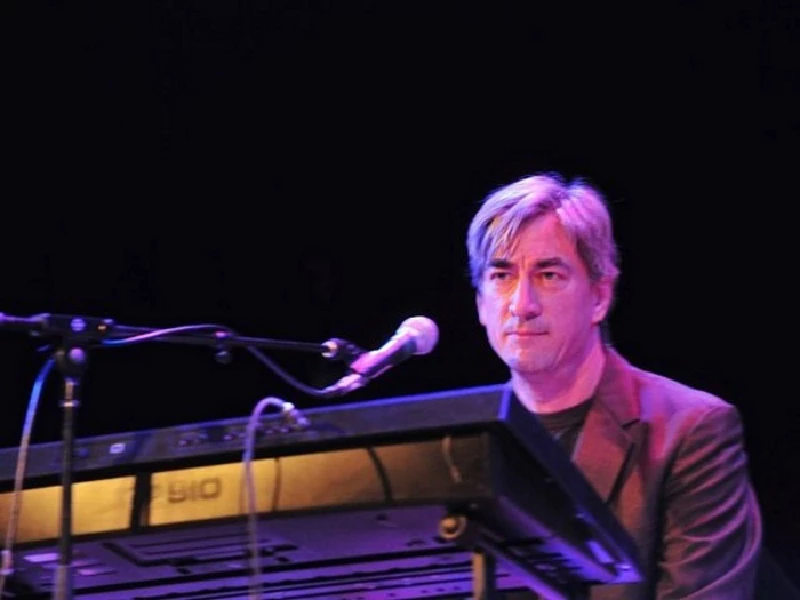
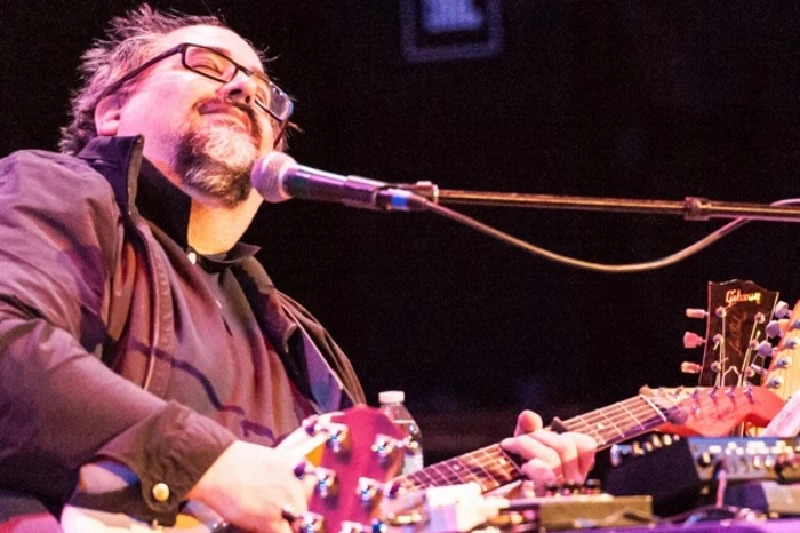
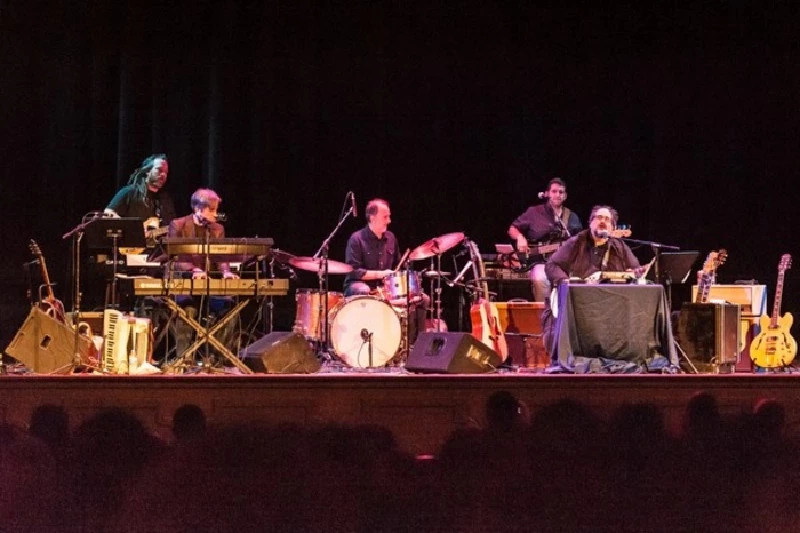
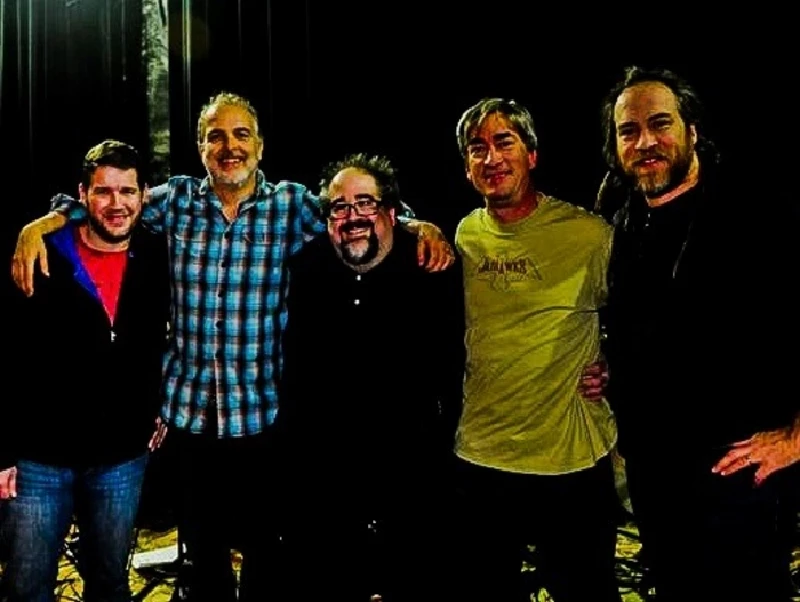
soundcloud
reviews |
|
Meta (2015) |
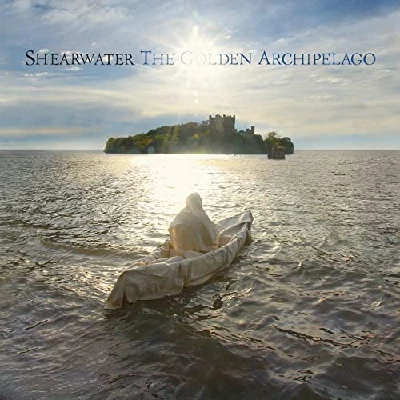
|
| Excellent but possibly slightly overlong third album from Pennsylvania’s the New Dylans who return twenty years after their last album with an hour-long collection of perfectly crafted folk/rock. |
most viewed articles
current edition
Peter Doherty - Blackheath Halls, Blackheath and Palace Halls, Watford, 18/3/2025 and 21/3/2025Armory Show - Interview with Richard Jobson
Liz Mitchell - Interview
Deb Googe and Cara Tivey - Interview
Lauren Mayberry - Photoscapes
Max Bianco and the BlueHearts - Troubadour, London, 29/3/2025
Garfunkel and Garfunkel Jr. - Interview
Maarten Schiethart - Vinyl Stories
Clive Langer - Interview
Sukie Smith - Interview
previous editions
Heavenly - P.U.N.K. Girl EPBoomtown Rats - Ten Songs That Made Me Love....
Trudie Myerscough-Harris - Interview
Doris Brendel - Interview
Beautiful South - Ten Songs That Made Me Love...
Pulp - Ten Songs That Made Me Love...
Dwina Gibb - Interview
Kay Russell - Interview with Kay Russell
Barrie Barlow - Interview
Sound - Interview with Bi Marshall Part 1
most viewed reviews
current edition
Davey Woodward - Mumbo in the JumboNigel Stonier - Wolf Notes
Wings - Venus and Mars
Kate Daisy Grant and Nick Pynn - Songs For The Trees
Only Child - Holy Ghosts
Neil Campbell - The Turnaround
Philip Jeays - Victoria
Darkness - Dreams On Toast
Suzanne Vega - Flying With Angels
Charles Ellsworth - Cosmic Cannon Fodder
Pennyblackmusic Regular Contributors
Adrian Janes
Amanda J. Window
Andrew Twambley
Anthony Dhanendran
Benjamin Howarth
Cila Warncke
Daniel Cressey
Darren Aston
Dastardly
Dave Goodwin
Denzil Watson
Dominic B. Simpson
Eoghan Lyng
Fiona Hutchings
Harry Sherriff
Helen Tipping
Jamie Rowland
John Clarkson
Julie Cruickshank
Kimberly Bright
Lisa Torem
Maarten Schiethart